
Renee joined our Dubai IP team last year to boost the firm's offering in the region
We recently caught up with her to find out what it's like working in the Middle East, how the Dubai IP can help with challenges international brands might face there, and how she spends her free time.
Can you tell us about a cross-border matter you’ve worked on since joining the firm?
There have been quite a few to date and thankfully a number of our clients have very active overseas portfolios. But for one specific example, we have been working on a worldwide rebranding strategy for an organistion within the hospitality industry. While the UAE office is the centralised point, the breadth of the task meant that I was able to work with a number of our offices, for example, London all the way across to Sydney. It’s a great way to meet others on the team and I hope we can continue to build on these relationships.
What challenges for international brands in the Middle East can the UAE IP team help with?
Our region can certainly be difficult for brand owners to navigate. From a very basic perspective, we can assist with advising clients on what is suitable in terms of their branding for the region, getting ahead of issues before it’s too late. Our team has collectively been in the region for years and as a result, we are all well versed in the cultural nuances of the area. Having legal counsel that is sensitive to these issues is well valued by clients.
International brands also sometimes struggle with using and protecting their brand in Arabic and this is something that we can help with. I have taken over a number of portfolios in the past where the client was advised to protect the wrong version of its mark in the local language, which is a very costly mistake to fix. Committing to a local language version has to be given due consideration, particularly as there can be multiple Arabic versions for one word in English.
One of the main challenges that we see international brands facing is the enforcement of their rights in this region. Often times, what would be considered an open and shut case in say the UK, would be fraught with difficulties here. Unfortunately, the nature of IP laws in the region combined with local practice can make the job very difficult, and we often see trade-mark agencies passing on such cases because it is out of their ambit. Having experience across most of the MENA region, we can help international brands navigate these complex challenges as fluidly as possible.
How does working in IP in the Middle East differ from other jurisdictions?
In terms of practice, one of the things that has struck me most is the emphasis placed on whether a mark breaches public order or public morality. This was never a regular issue in my practice in Europe, but it’s interesting to see how examiners view marks here, which we take for granted elsewhere.
What do you like to do in your spare time?
Lots of F45 classes which are high intensity, functional workouts that are strangely addictive. Also gathering stamps in my passport, especially as I am lucky to live in a country where travel is made so easy. And recently, I’ve finally managed to sign up for a photography course. Whether it turns into a hobby remains to be seen.